Over the past few years, we have all relied on our home electricity supply more than ever. Whether you have been working from home since lockdown, or you spend your weekends in front of the TV, much of our day revolves around the use of electricity. However, with the increase in reliance, we have seen a significant rise in the number of clients contacting us and asking, ‘Why does my electric keep tripping?’.
If your power keeps tripping, then there are ways that you can resolve the issue without an electrician, and we have put together an easy-to-follow guide on how to perform this simple routine.
Why does my electric keep tripping? Causes, solutions & preventions
There are many reasons why you may be experiencing power trips, such as an overloaded socket or problems with the circuit; however, in most cases, the issue can easily be rectified without the need to contact an electrician. Nevertheless, as with any electrical-related problem, if you are worried about your electrical circuits and would prefer professional guidance before carrying out any tests, our team of electrical contractors in Milton Keynes will happily answer any questions you have. They can assess the issue over the phone and recommend the next steps you should take. In the meantime, here is our top advice on the following topics.
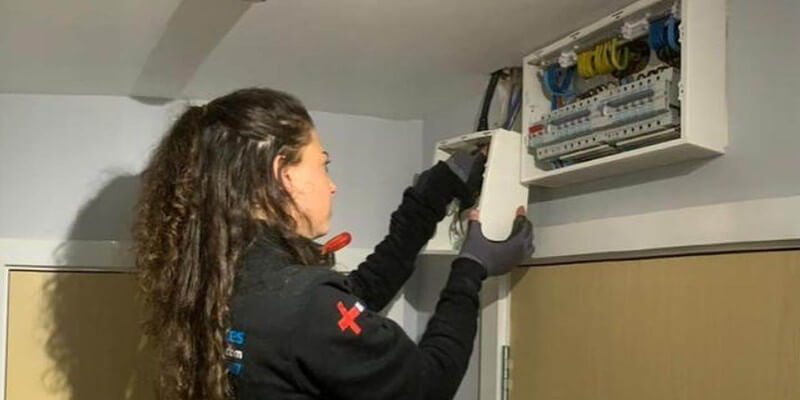
Why do my electrics keep tripping?
Electrical circuits can trip for a variety of reasons, and we know better than anyone how frustrating it can be when it keeps happening. One common cause is an overloaded circuit, which occurs when too many appliances or devices are connected to a single circuit or socket, exceeding its capacity. This can cause the circuit breaker to trip or the fuse to blow, resulting in power loss and potential damage to your electrical system – this is common in a business setting due to the many appliances plugged into the sockets.
To prevent overloaded circuits, ensure that your electrical appliances are distributed across multiple sockets and are compatible with their capacity. Additionally, it is best to avoid using extension cables as a permanent solution for powering multiple devices, as it can create a fire hazard. If you’re unsure about the capacity of the electrical system in your office or are experiencing persistent tripping issues, our talented team of commercial electricians in Milton Keynes will be more than happy to help.
Another common cause of electrical circuit tripping is a short circuit, which can happen when wires within the circuit come into contact with each other or when an appliance has a fault. This results in a sudden surge of electricity, causing the circuit breaker to trip as a safety measure.
Another cause of tripping electrics occurs when a live wire comes into contact with a grounded surface, such as a metal fixture or water pipe causing a ground fault. Identifying the underlying cause of the tripping is essential to prevent potential safety hazards and avoid further damage to your electrical system. It’s always best to consult a qualified electrician if you’re experiencing persistent tripping issues.
How to resolve an electric trip
Before contacting our team, we would always recommend completing the following steps; this will help you to determine whether the cause of the power trips is an appliance that needs replacing or an issue with the circuit itself. Follow the steps below or take a look at our “how-to” video for full instructions.
1. Find your consumer unit
The first step is to track down your consumer unit. In most properties, this is either in the cupboard under the stairs or in the garage.
Most homeowners have a dual RCD consumer unit, which means that there are two RCDs. If you are unsure what type you have, we recommend taking a look at our consumer unit page, which, if you scroll down on, you will find three examples of the most common options. Alternatively, we also have a full guide on what consumer units are and how they operate.
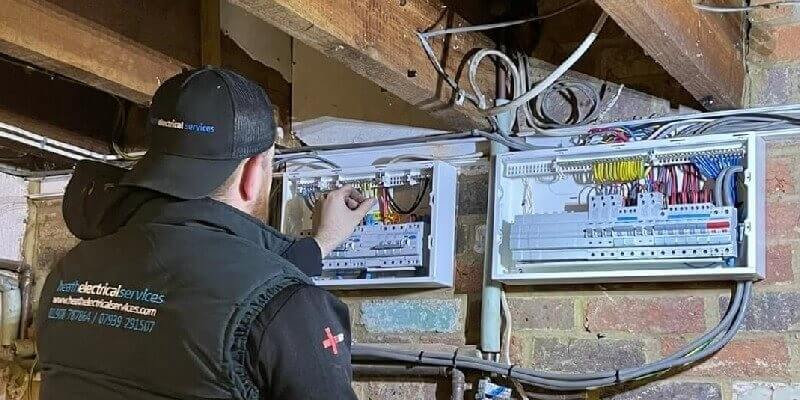
2. Checking the RCDs
The RCDs are the most likely component of your consumer unit to trip out, so you want to start by turning the RCD back on. If the power trips again after this, then you have a problem with your circuit.
In this instance, you will need to turn off all of the circuit breakers that relate to the RCD. The circuit breakers can be on the left or right side of the RCD, depending on what consumer unit you have.
Next, reset the RCD with the circuits off. If it does not reset, there may be an issue with the RCD itself. If so, contact one of our electricians if the RCD stays on.
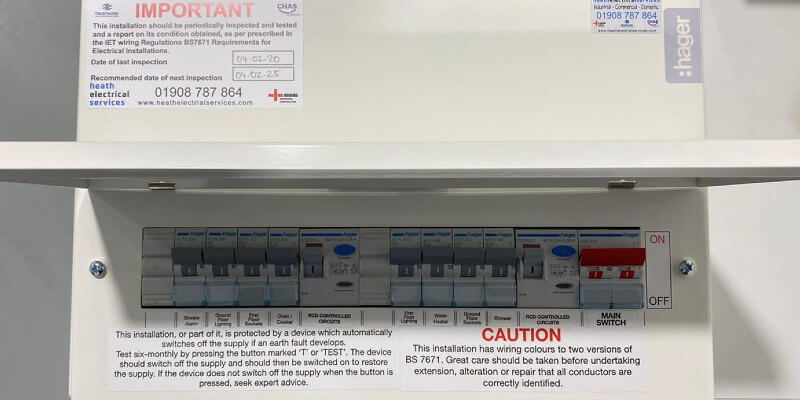
3. Finding the circuit problem
To determine whether you have an issue with something plugged in, begin by taking a look at the switches on your consumer unit. You will see that each switch is labelled with what component it relates to, i.e. the cooker or sockets. The easiest route is to try the sockets.
Before testing the sockets, go around the house, switch off the plugs, and unplug everything connected to the circuit. In some cases, you may know exactly what circuit the switch relates to, so you will only need to do this on the sockets that connect.
Once sockets are off and appliances are unplugged, go back to the consumer unit – you should now be able to reset the RCD. If the RCD does not reset, contact an electrician to investigate the fault further. We have a reputable team of experienced electricians in Milton Keynes who are able to visit your home to rectify any circuit issues. Please do not hesitate to contact us if you require assistance.
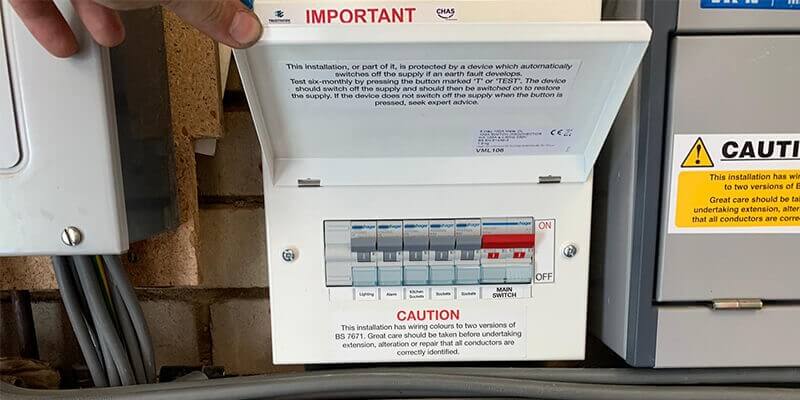
4. Dealing with faulty appliances
If the RCD has reset, then this is an indication that the power trip may be caused by one of your electrical appliances. Begin by attempting to reset the RCD and following the steps above.
If resetting a particular circuit breaker causes the RCD to trip, the fault is most likely linked to this circuit. Leave the circuit breaker off and disconnect appliances or switch off connected equipment (i.e., unplug appliances) if the fault is socket related. Switch off light switches if it is lighting-related.
If you notice that when you plug any of the appliances on, it causes the power to trip, then it means that this is what is causing the issue. We would highly recommend replacing this appliance to prevent future tripping.

How to stop power tripping
For those who have recently replaced their circuits or have good condition circuits but are still experiencing power trips, there are a number of ways that you can minimise the likelihood of losing power. These tips are straightforward lifestyle changes that you can make to prevent your power supply from overworking and include the following.
- Unplug any electrical appliances that are not in use; this will also help you to prevent wasted power and, therefore, save money on your energy bills.
- Consider how many appliances you have plugged into one socket. If possible, try to spread them across different outlets to avoid overloading the socket.
- Keep an eye out for any damage to appliances, such as frayed cords or scorch marks around the plug. We recommend replacing any damaged items before they have the chance to cause a danger.
- Be wary about using extension cords to power appliances that require a lot of power, such as TVs, as this can also be a culprit for overloading the main socket.
- Spend time understanding your amp usage, as this will help you to pair appliances with a socket that can withstand the electrical current they require.
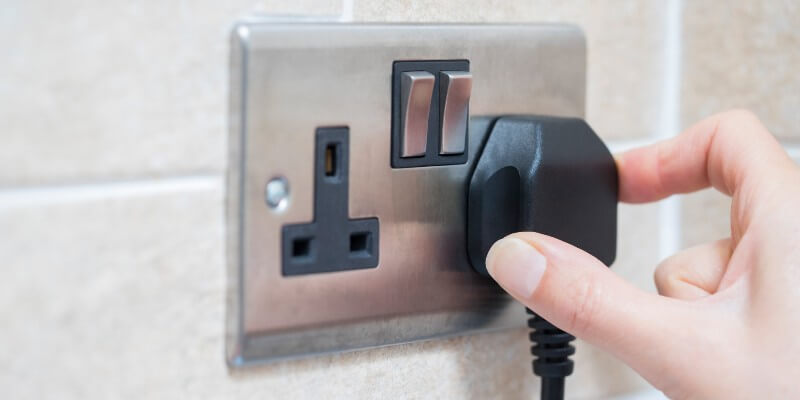
Preventing power trips is as easy as that!
At Heath Electrical Services, we are dedicated to ensuring that our clients can enjoy long-lasting, reliable electrical installations by minimising the likelihood of an issue. We take an honest approach which means that if we feel that you can rectify the problem without our assistance, we will always share our knowledge on the steps to take. Finding and resolving the cause of regular power trips is one of the most straightforward electrical-related tasks that you can complete yourself, and we hope that we have been able to guide you in the right direction. However, if you suspect you have a more serious issue or feel more comfortable leaving it to our experts, our engineers are always just a phone call away!












